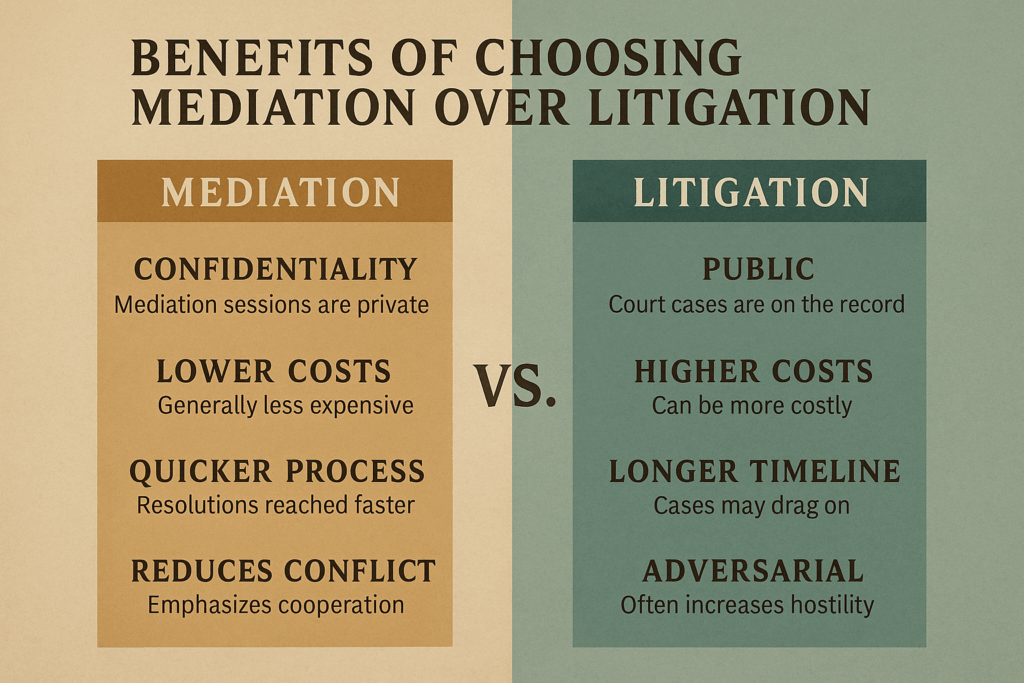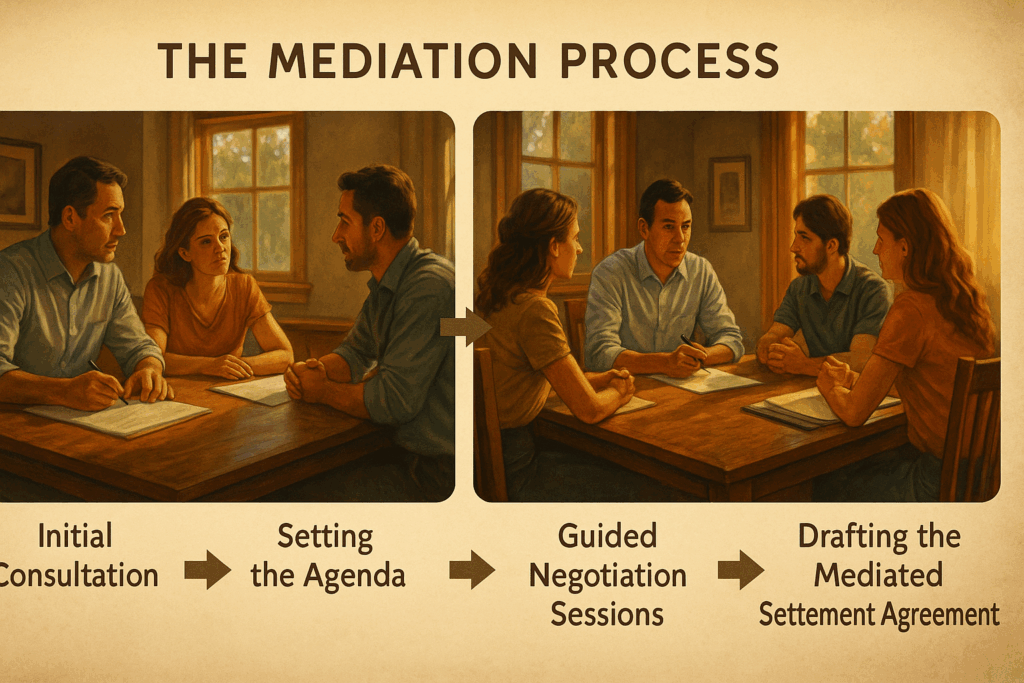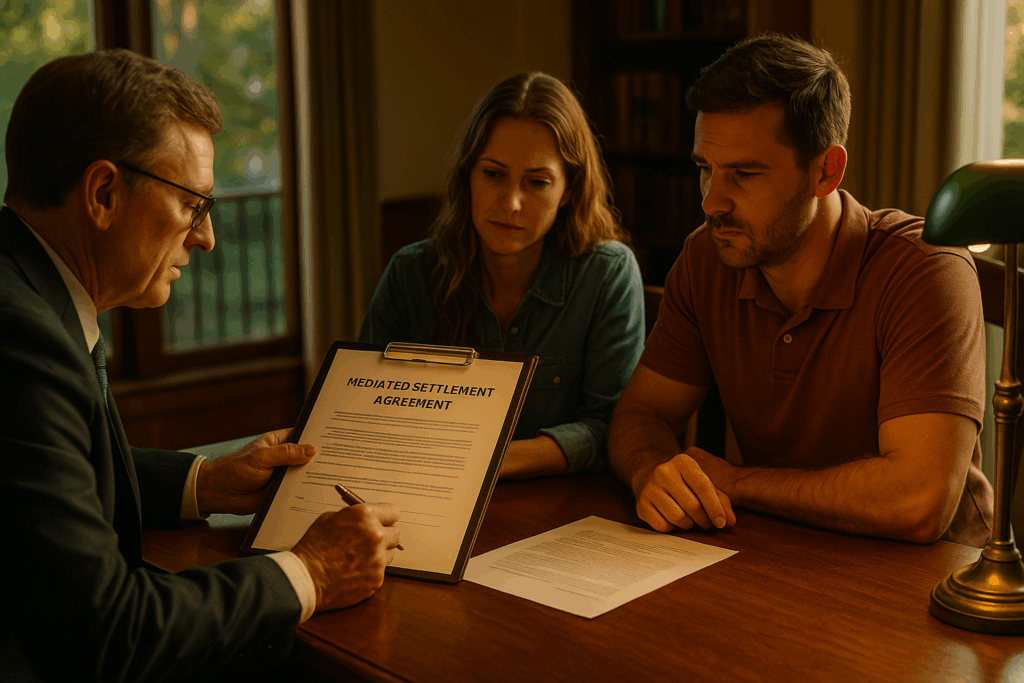
Ever tried helping your kid with math homework after a long day, only to realize your ex still has the graphing calculator—and maybe even the Wi-Fi password? Divorce doesn’t just divide a household—it can split routines, stress out kids, and send school performance into a tailspin. That’s where Texas Divorce Mediation Services step in: a smarter, calmer way to navigate divorce that protects your child’s education and emotional stability from becoming collateral damage.
In this blog, we’ll break down how mediation works in Texas, why it’s often better for families than courtroom battles, and most importantly, how it can directly support your child’s academic success. Short answer? Mediation gives parents the tools to keep school routines, support systems, and parenting roles intact—even while living under separate roofs.
You’ll get actionable tips (like how to talk to teachers during a split), insights from the Texas Family Code that most people overlook, and real-life stories of families who found peace through mediation—without sacrificing their child’s GPA or mental health. And because this is The Law Office of Bryan Fagan, PLLC, you’ll get practical, experienced guidance rooted in our mission: educating families and protecting futures.
Keep reading. Because your child’s school year shouldn’t have to suffer just because your marriage did.
Key Takeaways
- Texas divorce mediation services provide a structured approach to resolving disputes through a neutral mediator, ensuring that agreements are legally binding and enforceable.
- Mediation offers several benefits over litigation, including confidentiality, lower costs, and a quicker resolution process, while fostering cooperation and minimizing conflict between parties.
- The mediation process includes key steps such as initial consultation, agenda setting, guided negotiation, drafting a mediated settlement agreement, and obtaining court approval, all aimed at reaching a mutually beneficial resolution.
Understanding Texas Divorce Mediation Services
Divorce doesn’t have to be a courtroom showdown. Through Texas Divorce Mediation Services, many families find a practical, respectful way to resolve disputes while avoiding the emotional and financial toll of litigation. As our attorneys frequently advise, mediation offers a structured yet flexible process where a neutral third-party mediator helps spouses reach agreements on child custody, property division, and financial support—without stepping foot in a courtroom. It’s a compassionate solution that encourages cooperation and supports long-term family stability.
Under the updated Texas Family Code §§ 6.602 and 153.0071, a mediated settlement agreement (MSA) becomes legally binding once signed by both parties and, if applicable, their attorneys. The agreement must include language indicating it is not subject to revocation. Once incorporated into the final divorce decree, the MSA holds the same legal force as a court judgment. According to our family law team, this clarity gives divorcing couples the confidence that their decisions will be respected and enforced—without the unpredictability of trial.
Many Texas counties offer mediation through Dispute Resolution Centers, often at reduced rates for those who qualify financially. These sessions are private and guided by trained mediators who help couples communicate clearly and find common ground. In our experience, this environment leads to more personalized and lasting solutions, especially when children are involved. Parents can address academic routines, summer schedules, and co-parenting strategies in a way that prioritizes their child’s emotional and educational needs.
For a deeper look into how mediation protects your rights and streamlines the divorce process, explore our full breakdown of mediation in Texas divorce. You can also learn what to expect during your first session by visiting our guide to mediation services. As we’ve seen in our work with Texas families, mediation isn’t just about ending a marriage—it’s about building a stronger, more stable foundation for life after divorce.

Key Benefits of Choosing Mediation Over Litigation
Choosing Texas Divorce Mediation Services over traditional litigation offers families not only legal efficiency but also emotional relief during an already challenging time. As we’ve seen in our work with Texas families, mediation provides a confidential setting that shields sensitive family matters from the public eye—unlike courtroom proceedings, which are part of the public record. This privacy allows couples to speak more openly and negotiate without fear of judgment or exposure, fostering healthier communication and long-term cooperation.
From a financial standpoint, mediation is often significantly more affordable than courtroom litigation. With fewer procedural delays and lower attorney fees, couples can resolve their differences while preserving more of their shared resources—resources that are often better directed toward supporting children, relocating, or rebuilding after divorce. In fact, under Texas Family Code § 6.602, once a mediated settlement agreement is signed and meets specific legal criteria, it becomes immediately binding, saving parties additional court time and expense.
According to our family law team, another key benefit is speed. Mediated cases generally move faster than those tied up in the court system, giving families the chance to resolve issues efficiently and move forward with clarity. Mediation encourages collaboration rather than confrontation, and this mindset shift can lead to tailored solutions that honor the unique dynamics of each family—especially when children, shared business interests, or creative custody arrangements are involved.
To learn more about how mediation can benefit your specific situation, we recommend reading our in-depth resource on what mediation can do for you. You can also visit our divorce mediation page for additional guidance. Our legal professionals have helped many clients understand that mediation isn’t just about ending a marriage—it’s about setting the stage for a more peaceful and empowered future.

Common Issues Resolved Through Mediation
Mediation can effectively address a wide range of family law issues, making it a versatile tool for divorcing couples. One of the most common issues resolved through mediation is child custody arrangements. Mediation allows parents to collaboratively decide on custody and visitation schedules that work best for their children, ensuring that their needs are prioritized. Child support obligations are also frequently negotiated during mediation sessions, allowing for fair and equitable agreements.
The division of community property is another major topic often resolved through property division mediation in Texas divorces. This includes the division of assets, debts, and any other financial matters. Spouse support agreements can also be established during mediation discussions, providing clarity and security for both parties.
Additionally, mediation can be utilized to resolve conflicts related to family business ownership and management, as well as temporary orders concerning child custody and support, along with other issues and mediations.
When is Mediation Ideal for Divorcing Couples?
As our attorneys frequently advise, one of the most empowering aspects of Texas Divorce Mediation Services is the flexibility in timing. Mediation can begin at nearly any stage of the divorce process—before filing, mid-proceedings, or even after temporary orders are issued. According to Texas Family Code § 6.602, parties are allowed to resolve issues outside of court through a mediated settlement agreement (MSA), provided it meets the statutory requirements. This flexibility gives couples a valuable opportunity to reduce tension, avoid adversarial litigation, and prioritize more collaborative outcomes.
Mediation is especially beneficial for parents who want to protect their children from the emotional fallout of divorce. As we’ve seen in our work with Texas families, shielding children from courtroom drama can make a world of difference in their emotional and academic stability. By opting for mediation, parents are modeling cooperation and reducing the likelihood of conflict spilling into their kids’ day-to-day lives—something our firm is deeply committed to helping clients achieve.
Before your first session, it’s important to come prepared. Our legal professionals have helped many clients understand that outlining personal goals, identifying areas of compromise, and gathering key financial or parenting documents can set the stage for a productive experience. During the initial consultation, a trained mediator will assess whether mediation is appropriate and confirm both parties are emotionally and practically ready to engage in good-faith negotiations.
To explore some of the best options available to Texas families, we encourage you to read our article on top Texas divorce mediation options. You can also learn more about the process itself on our divorce mediation overview page. Mediation allows couples to take control of their divorce on their own terms, and when supported by knowledgeable legal guidance, it can lead to outcomes that feel fair, peaceful, and future-focused.

The Mediation Process Step-by-Step
According to our family law team, Texas Divorce Mediation Services are designed to offer divorcing couples a clear, compassionate, and structured approach to resolving disputes without the hostility of traditional litigation. The process typically begins with an initial consultation, during which the mediator evaluates whether mediation is appropriate for the couple’s circumstances. This meeting provides a foundation for setting expectations, reviewing each party’s goals, and ensuring both individuals are ready to participate in good-faith discussions.
Following the consultation, the mediator works with both parties to set the agenda—identifying the key topics to be addressed, such as property division, custody arrangements, or financial support. As outlined in Texas Family Code § 153.0071, once parties agree to mediate conservatorship or possession of a child, the resulting mediated settlement agreement (MSA) becomes binding if signed by both parties and includes the appropriate statutory language. Guided negotiation sessions allow both sides to speak openly while the mediator facilitates productive dialogue, helping to bridge gaps and uncover mutually beneficial solutions.
Once all terms are agreed upon, the next step is drafting the MSA—a crucial document that formalizes those decisions in writing. Our legal professionals have helped many clients understand how important it is that the MSA be precisely written to reflect the couple’s intentions and to avoid future disputes. After the document is finalized and signed, it is submitted to the court for approval. If the MSA meets the statutory requirements under Texas Family Code § 6.602, it becomes part of the final divorce decree, securing the terms as enforceable and permanent.
For a deeper look into how this step-by-step mediation process works, we recommend exploring our article on mediation for family law cases. You can also find additional insights on our divorce mediation services page. As we’ve seen in our work with Texas families, a well-guided mediation process not only resolves legal issues—it helps lay the groundwork for a healthier, more peaceful post-divorce future.

Initial Consultation
The initial consultation is the first meeting between the mediator and the divorcing couple, aiming to understand their issues and goals. During this meeting, the mediator assesses whether mediation is suitable for the couple’s circumstances. This face-to-face contact allows the mediator to gather essential information and address any common questions the clients may have.
It’s a critical step in the mediation process, setting the stage for productive and focused mediation sessions.
Setting the Agenda
After the initial consultation, the next step is setting the agenda. The mediator collaborates with both parties to define the key topics that will be addressed during the mediation sessions. This involves developing a list of discussion points based on the preliminary remarks and submitted information from the parties.
Establishing a clear agenda ensures that all relevant issues are addressed systematically, providing a structured framework for the mediation process.
Guided Negotiation Sessions
Guided negotiation sessions are the heart of the mediation process. During these sessions, the mediator facilitates discussions between the disputing parties to help them identify shared interests and explore possible solutions. The mediator encourages open dialogue, ensuring that both parties can express their views constructively and work towards bridging their differences.
These sessions are structured to direct conversations towards finding common ground and highlighting mutually acceptable resolutions. The mediator’s role is to guide the parties through negotiations, helping them navigate complex issues and reach a successful mediation outcome. This collaborative approach fosters a positive environment for resolving disputes and reduces the likelihood of future conflicts.
Drafting the Mediated Settlement Agreement
Once spouses reach mutual agreements during mediation, the next essential step is preparing the mediated settlement agreement (MSA)—a written, legally binding document that outlines each term the parties have resolved. According to Texas Family Code § 6.602, a properly executed MSA—signed by both parties and their attorneys, if represented, and containing the required non-revocation language—becomes binding and enforceable. As our legal professionals have helped many clients understand, this agreement is more than a formality; it safeguards both parties’ interests and helps ensure the divorce proceeds without future complications or misunderstandings.
To avoid errors or oversights, the involvement of an experienced family law attorney is crucial. At this stage of Texas Divorce Mediation Services, an attorney ensures that the MSA complies with all relevant legal standards and accurately reflects the parties’ intentions. When these agreements are drafted with care, they reduce the risk of later disputes or court challenges—particularly in complex areas such as custody schedules, spousal support, and the division of retirement accounts.
After the MSA is finalized, it is submitted to the court for review and incorporation into the final divorce decree. Provided the agreement meets the criteria outlined in Texas Family Code § 153.0071 (especially in cases involving child custody), the court will typically approve the settlement without requiring further litigation. As we’ve seen in our work with Texas families, this legal clarity allows both parties to move forward with confidence, knowing that their rights and obligations are firmly established and enforceable.
However, not every mediation ends in success. Some cases involve power imbalances, emotional volatility, or a breakdown in communication that can make consensus difficult. For a closer look at situations where mediation may fall short—and what to do when it does—we invite you to read our article: Why Doesn’t Mediation Always Work?. You can also explore our mediation resource hub to better understand your options at every stage of the process.

Court Approval
The final step in the mediation process is obtaining court approval. Once a mediated agreement is reached, it must be submitted to the court to become part of the official divorce decree. Approval from the court is necessary to incorporate the mediated settlement into the official divorce decree, making it legally enforceable.
This step ensures that the agreements reached during mediation are recognized by the court and provide a binding resolution to the divorce case.
Advantages of Working with Experienced Family Law Attorneys
As our attorneys frequently advise, navigating mediation without legal guidance can put your rights and long-term interests at risk. One of the key benefits of working with skilled legal professionals during Texas Divorce Mediation Services is having someone by your side who understands both the legal framework and the emotional stakes. Under Texas Family Code § 6.602, mediated settlement agreements become binding once signed and properly executed, meaning every word matters. Our family law attorneys ensure your agreement is drafted accurately and fairly, helping you avoid costly mistakes that could surface down the road.
An experienced attorney also serves as your advocate and strategist during mediation. They help identify what’s reasonable, advise on what’s negotiable, and protect you from settling under pressure. While mediators facilitate discussion, they do not represent either party. That’s why having a knowledgeable attorney involved—especially one familiar with complex property division, custody arrangements, or spousal support—is vital. Our legal professionals have helped many clients understand the power of legal coaching during and even outside of the mediation room.
At The Law Office of Bryan Fagan, we believe every client deserves more than one-size-fits-all advice. We take the time to understand your goals, anticipate challenges, and guide you with clarity. Whether reviewing a proposed agreement or actively participating in negotiations, we ensure you’re fully informed and legally protected throughout the process. This personalized approach often leads to faster resolutions, reduced conflict, and long-term peace of mind.
To learn more about how a divorce attorney can protect your interests during mediation, visit our page on Texas Divorce Attorneys. You can also explore our helpful mediation services overview to see how we support Texas families every step of the way. When it comes to your future, having trusted legal counsel makes all the difference.
Why Choose the Law Office of Bryan Fagan for Mediation?
The Law Office of Bryan Fagan is recognized for its extensive experience in family law, making it an excellent choice for mediation services. Bryan Fagan’s commitment to helping clients avoid court disputes is reflected in his focus on mediation as a means to resolve family law issues amicably. The firm’s experienced attorneys guide clients through the mediation process, ensuring that their interests are protected and that the outcomes are fair and equitable.
By choosing the Law Office of Bryan Fagan, clients benefit from personalized representation and ongoing support throughout their mediation journey. The firm’s commitment to communication and client-focused approach ensures that each client’s unique situation is addressed with tailored legal strategies, leading to successful mediation outcomes and a smoother divorce process.
How to Get Started with Texas Divorce Mediation Services
Getting started with Texas Divorce Mediation Services is a thoughtful and client-centered process—especially when guided by experienced legal professionals. As our attorneys frequently advise, mediation can begin at nearly any point in the divorce journey, whether before filing, after temporary orders, or as part of final settlement discussions. In fact, under Texas Family Code § 6.602, parties may choose to resolve their issues through mediation, and when a properly executed mediated settlement agreement (MSA) is reached, it becomes legally binding and enforceable once submitted to the court.
The first step typically involves scheduling a free consultation with our team. During this session, a qualified mediator will assess the issues at hand—such as child custody, support, and property division—and help the couple determine whether mediation is the right fit. Our family law team emphasizes preparation during this stage, guiding clients to gather essential documents, clarify their goals, and approach the process with a cooperative mindset. Even if court-ordered, mediation can be a proactive way to take ownership of the divorce outcome rather than letting a judge decide.
Couples who wish to move forward without attorneys present may participate in what’s known as self-represented mediation. While this option can work in low-conflict situations, we often encourage clients to seek independent legal advice to review any proposed agreements before they are finalized. Our legal professionals have helped many clients understand the nuances of mediated outcomes and how they intersect with court orders and long-term legal obligations.
To explore what to expect from your first mediation session and how our team can support you, visit our article on key aspects of Texas divorce attorney services for clients. You can also learn more about mediation through our divorce mediation services page. With the right guidance, mediation isn’t just a simpler process—it’s a powerful way to protect your family’s future and preserve peace through personalized solutions.

Conclusion:
Divorce doesn’t have to feel like a warzone—and your child’s report card shouldn’t be a casualty. When families choose to work together through mediation, it opens the door to calmer conversations, consistent school routines, and parenting plans that actually work in the real world. That’s the heart of what we do here at The Law Office of Bryan Fagan, PLLC—helping Texas families move forward without losing sight of what matters most.
Whether you’re deep in the process or just starting to think about your next steps, remember: you don’t have to figure this all out on your own. Our team is here to guide you through the legal details, support your parenting goals, and help you build a future that gives your kids every chance to thrive—both in and out of the classroom.
So take a deep breath, maybe grab a snack (because you’ve earned it), and when you’re ready, schedule a free consultation. Let’s talk about how we can help protect your peace—and your child’s academic success—every step of the way.
Texas Divorce Mediation FAQ
How much does divorce mediation cost in Texas?
Divorce mediation in Texas typically costs between $500 and $1,500 per session, depending on the mediator’s experience, complexity of the case, and whether attorneys are involved. Some county dispute resolution centers offer subsidized rates or flat-fee programs for qualifying individuals.
What is the downside to divorce mediation?
The main downside is that mediation requires both parties to cooperate. If one spouse is dishonest, manipulative, or unwilling to negotiate fairly, mediation may not result in a balanced agreement. Also, legal rights could be overlooked if you don’t have proper legal representation.
What are the 3 C’s of divorce?
The 3 C’s of divorce are Communication, Compromise, and Co-Parenting. These principles help guide couples through separation with less conflict and greater focus on long-term stability—especially when children are involved.
What not to say in divorce mediation?
Avoid accusatory or inflammatory statements such as blaming your spouse, bringing up past unrelated issues, or using language like “You never” or “You always.” Focus on solutions and future goals rather than reopening old wounds.
Who pays mediation fees in divorce?
Mediation fees are usually split equally between both parties unless otherwise agreed upon or ordered by the court. In some cases, one party may offer to pay as part of a settlement strategy.
What is the success rate of divorce mediation?
Studies show that divorce mediation has a success rate of 70–80%, especially when both parties are committed to reaching a fair resolution. It is typically faster and less costly than traditional litigation.
When should you not use mediation?
You should avoid mediation if there is a history of domestic violence, severe power imbalance, substance abuse, or if one party refuses to disclose financial information honestly. In such cases, litigation or court intervention may offer better protection.
What cases are not appropriate for mediation?
Mediation may not be appropriate in cases involving abuse, stalking, child endangerment, or where protective orders are in place. These situations often require legal safeguards that mediation cannot provide.
What are three disadvantages to mediation?
Three disadvantages to mediation include: (1) lack of binding legal advice during the process unless attorneys are involved, (2) potential for unequal power dynamics to influence outcomes unfairly, and (3) the risk of wasting time and money if mediation fails and litigation becomes necessary.






